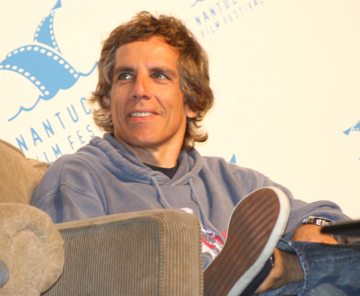|
|
||
|
Pro Tools
FILMFESTIVALS | 24/7 world wide coverageWelcome ! Enjoy the best of both worlds: Film & Festival News, exploring the best of the film festivals community. Launched in 1995, relentlessly connecting films to festivals, documenting and promoting festivals worldwide. Sorry for the interruption, we needed to correct and upgrade some modules. Working on a new website. For collaboration, editorial contributions, or publicity, please send us an email here. You need for put your full detail information if you want to be considered seriously. Thanks for understanding. User login |
Laura BlumLaura is a festival correspondent covering films and the festival circuit for filmfestivals.com. She also publishes on Thalo
 Probing "TransFatty Lives" with Producer Doug Pray
TransFatty Lives has its next incarnation in Hawaii. Having recently nabbed an audience award at the Tribeca Film Festival, the documentary by and about Patrick O'Brien will now get a "sneak peek screening for tastemakers" at the mini-film fest of the Pacific Rim International Conference on Disability and Diversity.* O'Brien's intimate tale begins in Manhattan, where the eponymous DJ and director of short films including Paraplegic DJ and Born Again Porn Star was making his gonzo art in 2005. All of 30, he was diagnosed with amyotrophic lateral sclerosis, or Lou Gehrig's Disease, and given two to five years to live. The movie documents O'Brien's experience of living, loving and creating over the course of a decade, as ALS gradually commandeers many of his physical capabilities. But TransFatty lives to tell the tale, as his film's title boldly proclaims. As his disease progressed, he had to give up editing duties. Producer Doug Pray and editor Lasse Järvi stepped in, crafting the swell of material into a visual work especially created for O'Brien's young son. To help parse TransFatty Lives, I caught up with Pray, who is himself the acclaimed director of Surfwise, Hype! and Levitated Mass, among other non-fiction titles. Yet Pray made a point of stressing that O'Brien called the shots in this film. It shows. For once we get a movie without the visual rhetoric of othering, unlike so many productions where a character is portrayed from a remove -- as exotic, awe-inspiring, terrifying and/or pitable -- for the benefit of the presumably able-bodied audience. To be sure, this is one picture where a person with disability is neither dusted with saccharine nor framed in isolation. O'Brien insists on including his audience smack in the middle of his day-to-day struggle to function and produce. Did the filmmakers worry that people with -- or without -- ALS would find the film depressing? According to Pray, who also shared a writing credit, this was a concern because the film shows "in painstaking detail exactly what’s happening to Patrick during his physical decline." However, Pray explained, "because people are watching a film directed by someone who has had ALS for 10 years and has made a movie that is premiering at major film festivals, its public triumph seems to outweigh the disease’s other realities."
Pray conceded that he feared able-bodied ticket buyers would see TransFatty "as an ALS film and wouldn’t watch it -- that they'd be concerned it would be a political or medical film." He and his colleagues have been pleasantly surprised. Noted Pray, "It’s mind-blowing because even though everyone has heard of the ice bucket challenge, and maybe even done it, very few people actually know what ALS does to the body, and even fewer understand that the mind remains brilliant." Asked about the artistic choices that informed TransFatty's most powerful scenes, he replied, "The most talked-about scene is when Patrick is having extreme difficulty breathing. An ambulance has arrived. His sister is helping him and she's crying, but throughout the whole scene, he is directing her to shoot it all with her videocamera, asking her to point the camera at herself, to zoom out, and so forth. It shows Patrick’s incredible tenacity to keep filming his documentary through what is obviously intense suffering." Pray also homed in on the scene before O'Brien goes in for surgery on his stomach to insert a feeding tube. "He's joking with the doctor and says he wants to be an 'electric vegetable,' followed by about the warmest smile you’ve ever seen. It's a major transition for the audience: he’s so likable (lovable) in this moment, they are sort of 'with' him now, and that lasts for the rest of the film." Read on for the rest of our exchange. Q: What was it like to collaborate with O'Brien? DP: The collaboration with Patrick has been an amazing journey for me, and for our editor, Lasse Järvi, and others on our team. When Patrick began the film 10 years ago, he was able-bodied and able to talk with his own voice. During the last three to four years of filmmaking, he was too paralyzed to physically edit or shoot scenes, and could only talk via text-to-speech using his eyeballs to type. Everything in the latter stages of the film and its edit came from his writing and his mind. It’s been an incredible experience to receive his direction via email, to help interpret it, to go back and forth with him in a deep creative discussion, and bring this stuff out. It’s definitely been a team effort, and Patrick has been at the center of all decisions. Q: Offhand it's hard to think of another film that's so uncompromising in its candor about what life with a disability is like. Were there images or thoughts that you adjudged "too much" for the public? How would you describe where you draw the line, if in fact there was a line? DP: I think that is what makes this film utterly unique. There was never a line drawn about what to show or not show relating to Patrick’s body or the march of the disease. When you have 100 hours of footage, though, it takes months and months to edit. But those are story decisions about what to omit. That’s just writing and rewriting; in terms of censorship, there was none. Q: The history of cinema is littered with desexualized, infantilized depictions of people with disability. Talk about how TransFatty Lives dodges that stereotype. DP: From the first scenes in the movie we realize that Patrick is anything but those things. Patrick’s prior work tended toward an openness to sexuality, deviance, and not hiding anything, which plays into his willingness to bare all in this film. Q: What's your biggest hope for this film in shaping attitudes and public policies? DP: As a producer, my biggest hope for the film is that it break out of the “disease film” genre. There is an irreverence and an unsentimentality that audiences seem to be responding to. There are many amazing and moving films being made about living with chronic or terminal diseases, but it would be great for people to feel like it’s OK to make a film that is brutally candid, funny and unexpectedly entertaining. What seems to be working with this film is that the advocacy and political messages are arrived at through an emotional connection with a real, live “breathing" (via respirator) character, and not via experts or narrators or information. Therefore, the message comes through loud and clear. This is a terrible disease that needs a lot more funding for a treatment and cure. Q: How has the film been received to date? DP: Unlike with most documentaries, we are finding that every single person stays in the theater for the Q&A afterwards. We have witnessed a wide range of emotions -- tears, laughter, everything you’d want the audience to be feeling for a movie. Patrick was able to join us for two of the four Tribeca screenings, which was profoundly exciting and emotional. When we played at HotDocs Toronto, he was live on the movie screen via Skype for the Q&A and was able to talk (through assisted speech) and make hysterical off-color jokes, which completely cracked up the audience. Though it’s too early for us to be receiving reviews, early response on the Internet and in trade publications has been very positive. * For full disclosure, I am a PacRim keynoter and curated the mini-fest. 18.05.2015 | Laura Blum's blog Cat. : ALS DJ Doug Pray Pacific Rim International Conference on Disability and Diversity Patrick O'Brien TransFatty Lives Tribeca Film Festival Hollywood
|
LinksThe Bulletin Board > The Bulletin Board Blog Following News Interview with EFM (Berlin) Director
Interview with IFTA Chairman (AFM)
Interview with Cannes Marche du Film Director
Filmfestivals.com dailies live coverage from > Live from India
Useful links for the indies: > Big files transfer
+ SUBSCRIBE to the weekly Newsletter DealsUser imagesAbout Laura BlumThe EditorUser contributions |






























